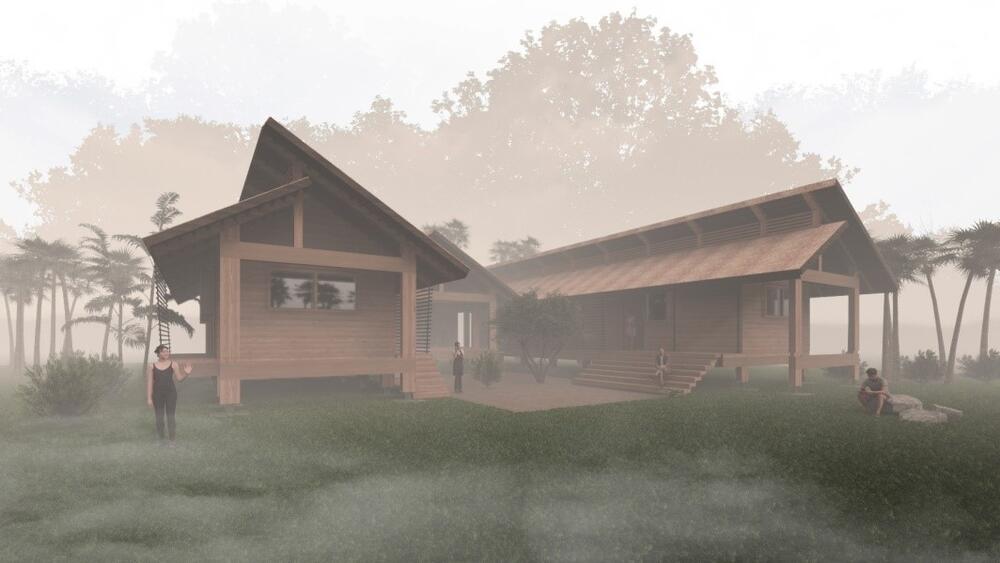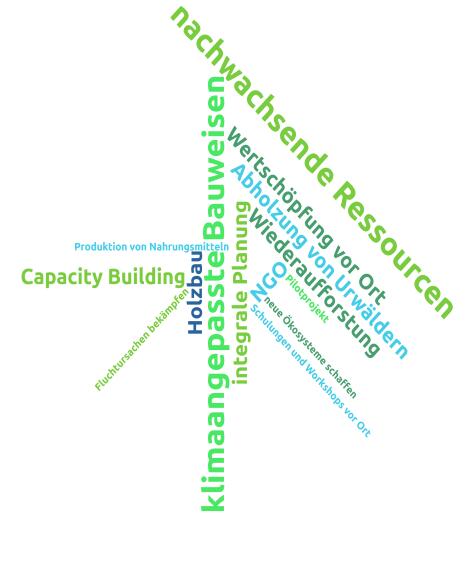Development of a new sustainable timber construction system made of Sengon light wood for subtropical climates using Borneo (Indonesia) as an example
International project funding
Subject and goals of the project
On Borneo, as in many other subtropical regions of the world, virgin forests have been and are being cleared on a large scale in order to plant palm oil plantations. Both the catastrophic consequences for the ecosystem and for the living conditions of the indigenous population groups living there require a rethink.
Fairventures Worldwide is a very successful NGO that reforests the deforested areas. Within this program, very fast growing Sengon trees are planted with and for the farmers living there, which can be harvested after about seven years with a circumference of 90 cm. They are processed in local companies to multilayer and glued wood panels, which are then used as basic material for furniture.
The project at hand extremely expands the application case for sengon woods by using the lightweight wood panels as a base product for the construction of buildings.
In Indonesia, too, a growing construction activity using concrete, aluminum and steel construction is displacing traditional building methods. These new construction methods do not meet climatic, ecological or hygienic requirements and lead to both overheating and enormous mold growth. These deficiencies are to be countered by the development of house systems made of the multilayer panels of Sengon wood.
Instead of the corrugated sheet metal used, thin sheets of spliced bamboo are to be used both as roofing and for cladding facades. Bamboo is available locally in large quantities.
As a pilot project, a forest campus is to be built at the Sengon sapling rearing station in Kalimantan (Borneo) for the people working there and for visitors, providing accommodation, a kitchen, seminar rooms, guest rooms and an information pavilion.
The flexible additive basic structure is to be adaptable to regional conditions. A statically effective frame with a center distance of 2.40 m, which corresponds to the plate dimension, is being considered. It should be easy to construct by local residents and consist entirely of renewable raw materials. Therefore, the building elements must not be too large to be transported on a pick-up truck.
Innovation and exemplary nature of the project
The aim of the development work is to develop a sustainable building system based on fast-growing lightweight wood and bamboo that is suitable for the ecological and climatic conditions of subtropical climates. It should also be transferable to other emerging and developing countries.
The global consequences of worldwide deforestation are exacerbating climate change and destroying valuable ecosystems. The project presented here usefully complements the work of an NGO that is achieving great success with reforestation programs. The reforestation programs have both ecological benefits and significant social importance. New sources of income can be created for the local indigenous population and causes of flight can be combated. The rapidly growing trees bind CO2 and create new ecosystems for flora and fauna.
The construction system is intended to replace current CO2-intensive building components made of concrete and corrugated sheet metal. The building system is intended to promote the replanting of cleared primeval forest areas and to secure a permanent income for the rural population.
Special aspects of the project
The sample project in Kalimantan will be set up under the supervision of the planners; the workers will be trained and instructed on site. Here, the timber construction system will be tested and evaluated. After monitoring and, if necessary, optimization, the building system will be comprehensively documented and presented at conferences and workshops.
The building will be visited by visitors, guests and supporters of the reforestation program and is therefore well suited for the transfer of the innovative building idea to multipliers.
The developed building system can be easily realized using regionally renewable building materials such as Sengon wood and bamboo shingles. It is thus well suited to create sources of income for the local population and to ensure the use of the rapidly renewable Sengon logs. During the rearing phase, more food can also be produced under the growing trees, thus securing income.
Funding subject: Climate- and resource-saving construction
Cooperation partners:
- Löffler-Schmeling Architects PartG, Karlsruhe
- Karlsruhe Institute of Technology (KIT), Karlsruhe
- Transsolar Energy Technology GmbH, Stuttgart
- Fairventure Social Ferestry FVSF GmbH, Stuttgart
- Blaß & Eberhardt Engineering Office GmbH, Karlsruhe
Location: Borneo (Indonesia)
Funding period: June 2019 to October 2021
Project costs: Total volume: 222 534 Euro, DBU funding: 120 342 Euro
DBU-AZ: 35144
Note: Translation of the German version with DeepL
Last updated: 12.11.2021



